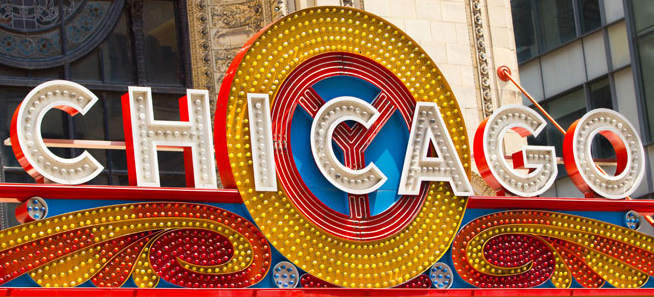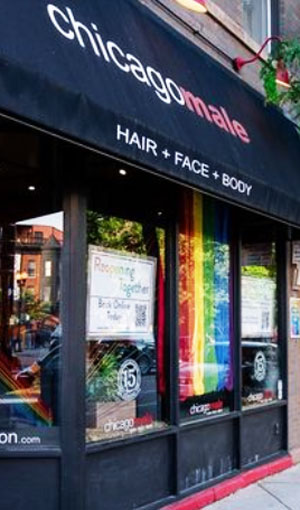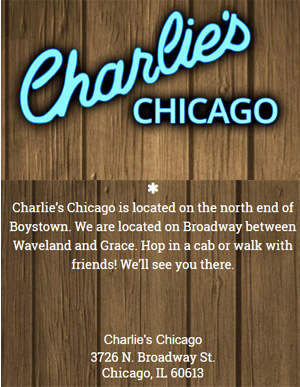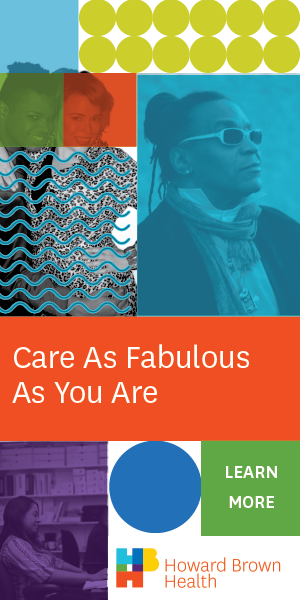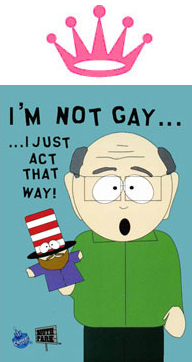Chicago House Residents Say IT GET’S BETTER
Do you ever stop and count your blessings?
Take a moment and think about how lucky you are?
Have a moment of gratitude?
I think many of us, rush through day to day life and forget there are a lot of people out there worse off. Just this past weekend, hundreds of men and women came out for a festive gala brunch, thousands of dollars was raised, and we all get so caught up in the moment and the fun of it all, some of us, sometimes forget what it’s all about, if we don’t see it. We know it’s a good cause, but we sometimes may forget the face, the real people, attached.
At the annual Chicago House brunch this past week, I was personally humbled by Stan Sloan’s speech. And I felt compelled to share it with everyone, in case you missed the event…..
Hi, my name is Stan Sloan, and I’m in my 11th year as the CEO of Chicago House. And I just wanted to start out my talk today by saying, “It gets better.”
It gets better. Hopefully everyone in here is aware of the importance of that phrase from Dan Savage and from the Trevor Project that has done so much great work with for the subject of LGBT youth and LGBT suicide. But last Sunday, Easter Sunday, I promised myself that I was going to work on this talk for today. And without a clue of what I was going to say, I decided to go and spend the day with the residents of our Supportive Living Program.
As many of you know, our Supportive Living Program is one of our five residential facilities for people who have HIV and AIDS and that have no where else to go. The Supportive Living Facility is the first step for our housing. The 16 residents who live there have come to us directly from the streets, from the shelters, from prison or detox centers, or directly from experiences of having been kicked out of the homes of their parents, friends or lovers…most often as a result of revealing that they have HIV.
Spending Easter with the residents of the Supportive Living Program may sound depressing, but nothing could be farther from the truth. If Easter is about springtime and moving from death of winter into the life of summer, then there is no better place to spend Easter than with these 16 men and women who, for perhaps the first time since they were diagnosed with HIV, have hope for moving from the death of their past lives to the life of what’s possible. Hope for moving beyond the perception that their life with HIV meant that there was no new life to follow.
As many of you know, our Supportive Living Program is one of our five residential facilities for people who have HIV and AIDS and that have no where else to go. The Supportive Living Facility is the first step for our housing. The 16 residents who live there have come to us directly from the streets, from the shelters, from prison or detox centers, or directly from experiences of having been kicked out of the homes of their parents, friends or lovers…most often as a result of revealing that they have HIV. Spending Easter with the residents of the Supportive Living Program may sound depressing, but nothing could be farther from the truth. If Easter is about springtime and moving from death of winter into the life of summer, then there is no better place to spend Easter than with these 16 men and women who, for perhaps the first time since they were diagnosed with HIV, have hope for moving from the death of their past lives to the life of what’s possible. Hope for moving beyond the perception that their life with HIV meant that there was no new life to follow.
As many of you know, our Supportive Living Program is one of our five residential facilities for people who have HIV and AIDS and that have no where else to go. The Supportive Living Facility is the first step for our housing. The 16 residents who live there have come to us directly from the streets, from the shelters, from prison or detox centers, or directly from experiences of having been kicked out of the homes of their parents, friends or lovers…most often as a result of revealing that they have HIV. Spending Easter with the residents of the Supportive Living Program may sound depressing, but nothing could be farther from the truth. If Easter is about springtime and moving from death of winter into the life of summer, then there is no better place to spend Easter than with these 16 men and women who, for perhaps the first time since they were diagnosed with HIV, have hope for moving from the death of their past lives to the life of what’s possible. Hope for moving beyond the perception that their life with HIV meant that there was no new life to follow.
So I went to SLP to be with those 16 residents on Easter, only to find out that none of them were there. One of our donors, who shall remain anonymous, had beat me there that day, and had left our staff member with money to take them all out for Easter pizza at Leona’s just down the street on Augusta. So I got back in my car and went to Leona’s to find four tables pushed together with 17 of the most diverse people that you can imagine packed next to each other. The oldest was 72. The youngest was 20. They were black and white and brown. They were men and women. They were gay and straight and transgendered, they were drop outs from Jr. High School and downtown executives who had lost everything to crystal meth and HIV. And they were laughing and eating together like brothers and sisters.
At least until I walked up. Nothing can ruin a party quite like the CEO walking in unannounced. “Listen,” I said as they pulled up a chair for me, “next Sunday I am giving a talk to 400 donors of Chicago House. What do you think I should tell them?” Most of them shrugged their shoulders until one of the women spoke up. “Tell them,” she said, “tell them that it gets better.”
At least until I walked up. Nothing can ruin a party quite like the CEO walking in unannounced. “Listen,” I said as they pulled up a chair for me, “next Sunday I am giving a talk to 400 donors of Chicago House. What do you think I should tell them?” Most of them shrugged their shoulders until one of the women spoke up. “Tell them,” she said, “tell them that it gets better.”
What gets better?
“Living with HIV…” she said. “Tell them that at Chicago House, living with HIV gets better.” “Is that what I should tell them,” I asked the rest of the group, and different people spoke up. A young intern from Sweet Miss Giving’s bakery who is only 21 and who was born with HIV from a crack addicted mother said how she had stopped taking her medication because she thought it was hopeless before arriving at our door. In her short time with us she has gone from a viral load of over 2,000 to being undetectable.
A man spoke up about the death of his partner and of the depression and drug abuse that left him homeless that followed. One of the older men spoke about how he had lived at Chicago House ten years ago and left because he didn’t want to follow the rules. “It took me 10 years,” he said, “but I finally realized that the rules weren’t near as bad as the rest of my life, so I came back and…” “It gets better” the original woman chimed in, and the whole table went up for laughs.
Today Chicago House provides housing and support services to over 1,100 people a year. Over the last 11 years we have worked hard to change the dynamic of that housing and services from a system that helps people get on benefits and supports that will let them live the rest of their lives with HIV in comfort to one that helps them move from those benefits and supports to lives that are fully engaged in the world and independent.
Over 500 people city-wide have been through our Employment Program which is the only program specifically targeting those with HIV and AIDS who are unstably housed in the nation. Our placement rate for the employment program is over 60% even in this economy. Sweet Miss Giving’s Bakery, Unquestionably Kind, Unreasonably Good! has a 100% placement rate for those trained in baking, packaging, customer service, and delivery through its internship.
Our prevention and medication adherence programs are stopping the spread of HIV in the LGBT and other at-risk communities, and they are helping those who are already impacted live long healthy lives. And, of course, our housing programs which serve over 200 adults and 50 kids annually are helping people develop the skills they need to gain stability and eventually independence, so that they can move on to open a space for someone newly infected and in need of hope.
It gets better. For Dan Savage and the Trever project the simple message of “it gets better” only makes sense in the context of encouragement and support. A struggling LGBT kid may not be able to imagine a better life on his or her own, but now he or she doesn’t have to. Now they can simply go to Youtube and find people…from Lady Gaga and Ellen to President Obama…imagining it for the. The clients of Chicago House most often come to us…black and white, men and women, homeless and white collar executives, gay, straight and transgendered…but with one thing in common…they have lost their ability to imagine a hopeful life with HIV, but At Chicago House it gets better. It gets better because Chicago House believe in them, and that is possible because you are here and believe in us.
It gets better. With your help and support it gets better.
Chicago House. We were there at the beginning.
We will be here till the cure.
Chicago House can always use volunteers.
Maybe this is your year to lend a hand?
CHECK OUT ALL OF THE GREAT EVENT PHOTOS AND
FASHION MODELS ON OUR FACEBOOK PAGE and LIKE US!
BestGayChicago.com

